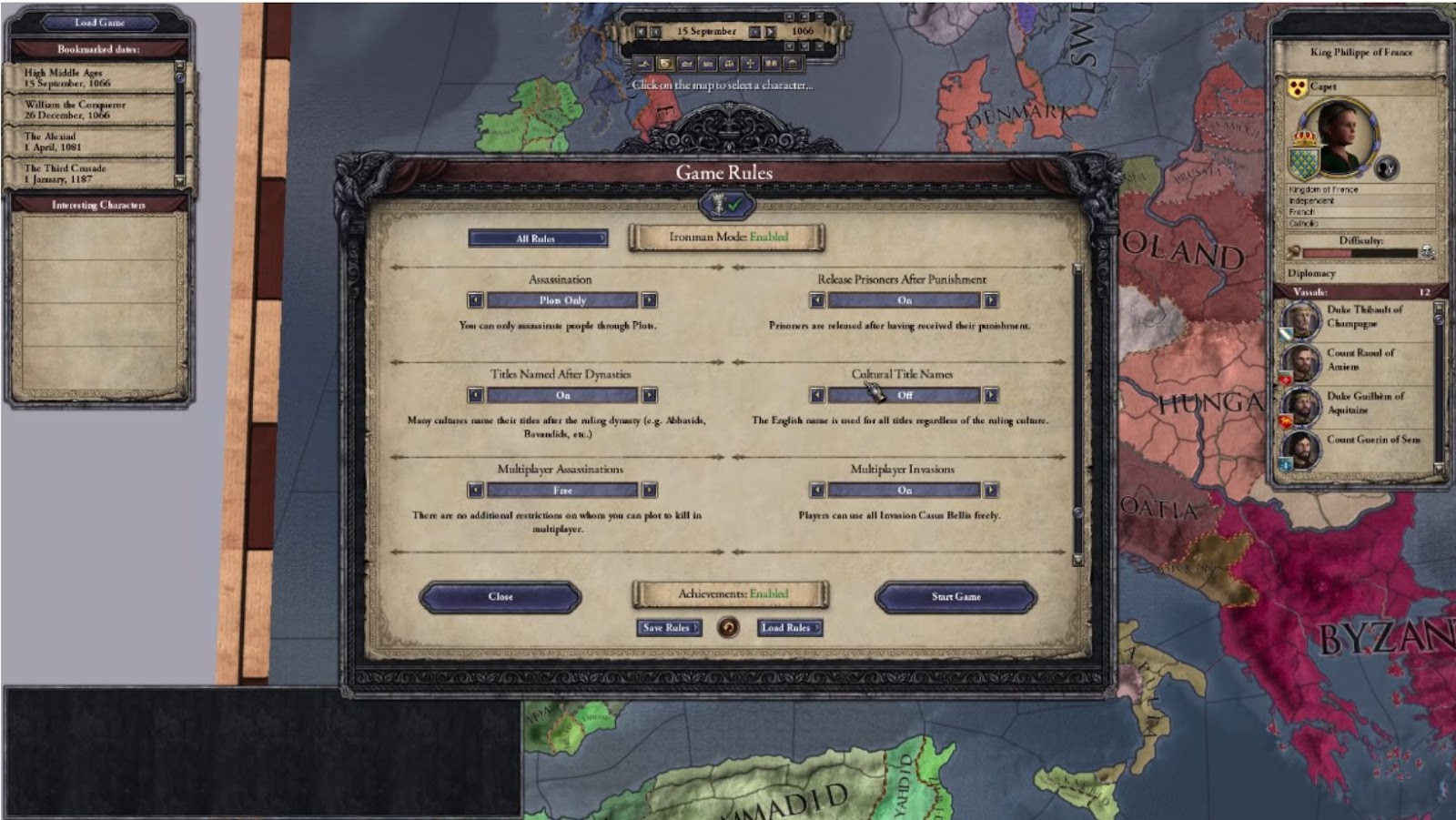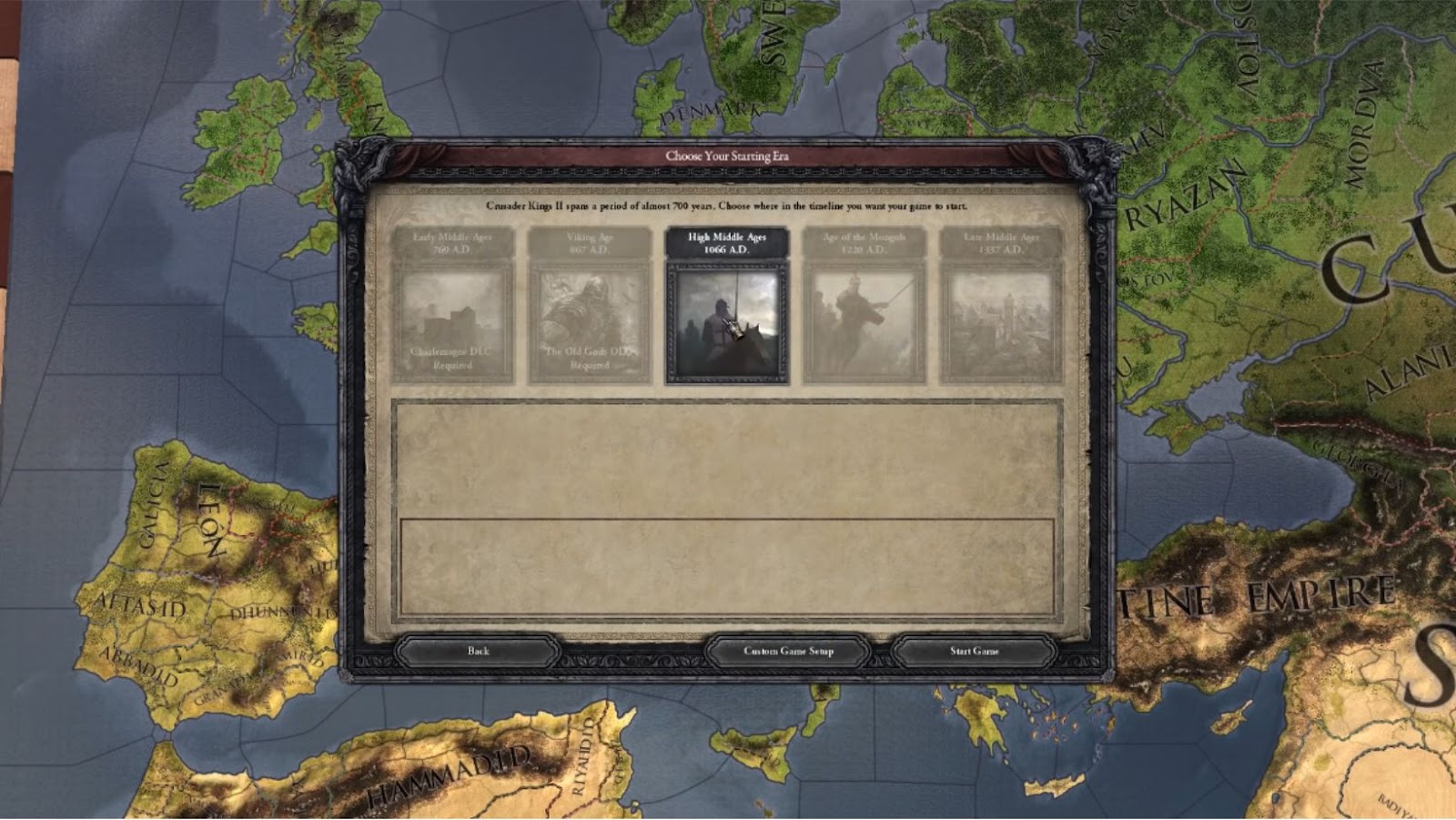
To gain an edge over your opponents in Crusader Kings 2, you must master the art of pressing claims. This requires a solid understanding of claims and their significance in the game. In this section, we’ll explain claims and why they are crucial. We will also explore ways to use these claims to your advantage for success.
Explanation of Claims And Their Importance in The Game
Claims in Crusader Kings 2 are a must for gaining power. They are rights to rule and can be used to press your or someone else’s claim on a certain title or land. A well-planned claim war can provide legitimacy, prestige, and marriage opportunities.
Having claims also means more inheritance chances. But, remember that pressing someone else’s claim won’t transfer the land ownership unless they become your vassal.
Declining wars based on claims is tempting, but you must consider other factors like military strength and allies. Also, don’t forget the potential negative consequences such as a lowered opinion of you from those on the losing side.
So get ready! In Crusader Kings 2, it’s not who’s right, it’s who’s left standing.
Strategies For Pressing Claims
To become the most powerful ruler of Crusader Kings 2, you must know how to press your claims effectively. In this section, “Strategies for Pressing Claims,” we will provide some tried and tested methods to advance your power. By using these innovative techniques, such as marrying into a dynasty, fabricating claims, using plots to gain claims, and more, you can achieve dominance over your enemies.
Marrying into a Dynasty to Gain Claims
Marriage could be a strategic way to strengthen claims. Through this, alliances can be formed, political favor can be gained, and access to assets unlocked. Gaining inside knowledge of a target’s resources is also possible.
Discretion is key. Alliances can be delicate, and motivations can change fast. Therefore, calculated decisions are necessary to stay in the political landscape.
Pro Tip: Before pursuing a relationship, identify and mitigate any existing hostilities. This will help ensure success.
Fabricating Claims
To claim without factual evidence or exaggeration, one can craft false stories that appear plausible. This dishonest practice can befuddle unprepared or kind listeners. To stay honest, it is best to back statements with proof, use logical thinking and be sensible. This reduces potential legal issues and makes claims justifiable. For successful claims, it is important to use well-researched arguments. This will help get the decision-makers on your side while avoiding lying. Telling lies or verbally defaming someone can have unpleasant consequences such as fines, lawsuits and jail time. When pressing claims, the information given should be new and different from what most people know. This will draw attention to how different views can affect the situation’s outcome. For example, Apple was sued by Samsung for patent infringement in 2012. Instead of refuting the accusations, Apple used a marketing firm to hire ‘experts’ who discussed Samsung’s lack of innovation. Apple won the case due to Samsung’s feeble evidence like designs unrelated to smartphones and not addressing the allegation. It proves that when claiming something, unique evidence should be used.
Inheriting Claims
Managing Inherited Claims
Inheriting claims can be tricky and overwhelming both emotionally and legally. However, knowing the laws and getting expert legal advice can help you manage it better.
Gather all documents related to the claim. This includes financial records, contracts, insurance policies, receipts, and other evidence. Compiling this data will give you an edge in negotiations and court.
Assess the value of the claim based on expert reports or market trends. This will help you develop strategies for settlements and negotiations.
It’s important to get a knowledgeable lawyer to avoid costly mistakes. They will guide you through the process and represent you if need be.
Be proactive when talking to people involved in the case, such as lawyers and insurance companies. This way, negotiations will go smoothly and avoid delays that could lead to a bad outcome.
To sum up, when dealing with inherited claims, you should:
- Study your rights as an heir
- Get documents to prove the claim
- Get legal advice right away
- Communicate with everyone involved
Claim Wars And Conquest
Fierce competition in today’s market means ‘Claim Wars and Conquest’ are commonplace. But how can businesses press their claims without risking their reputations?
The first step to successful claim pressing is creating a plan. This includes understanding the legal processes, key stakeholders, and relevant data. The table below outlines several critical strategies for claim pressing.
1.Research legal proceedings and requirements
2.Gather evidence through documentation and witness testimonies
3.Negotiate with opponents or competitors before escalating legal proceedings
4.Maintain transparency to avoid tarnishing reputation
It’s important to tailor your approach to each claim war. Knowing when and how to escalate high-stakes wars is essential. Professional help can also be very useful.
Don’t miss out! Take bold steps to claim what’s rightfully yours. But beware – it’s harder to hold onto a claim than gain it.
Usage of Plots to Gain Claims
The art of storytelling can be a great asset when pursuing claims. Using narrative techniques, claimants can create a persuasive case that captures their audience.
Characterization, tension building and dialogue are all methods that may prove effective. It is also important to understand the audience and adjust the story accordingly. Real-life accounts can help communicate the gravity of the situation and elicit empathy.
It is essential to use these strategies ethically and truthfully. Nevertheless, history shows us that even complex cases can be won through storytelling. With the right techniques and solid evidence, claimants may have a better chance of success.
Choosing the right claim is key; it’s like fitting a square peg into a round hole won’t work!
Choosing The Right Claim to Press
To choose the right claim to press in Crusader Kings 2, evaluate the strength of your claim, consider potential allies and enemies, and analyze the current political situation. These subsections will help you understand how to press your claims successfully and maximize your chances of winning battles and expanding your kingdom.

Crusader Kings 2 How to Press Claims
To ensure a successful outcome, it is crucial to assess the viability of your claim. Assessing the strength of your case helps you decide which course of action to take. Thoroughly investigate all evidence before evaluating the potential for success.
Before selecting a claim, key factors such as cost and time must be considered. Also, ensure sufficient evidence to support it and if the counterparty has legal merit.
Claim selection should be based on analyzing factors specific to the individual case. For example, certain liability laws or employment contracts may influence the chance of winning.
An example is a car accident involving a drunk driver. The injured party sought legal counsel and conducted preliminary research. Even though there was enough evidence to move forward, the attorney found more specific liability laws which maximized their chances of maximum compensation.
Picking which claims to pursue isn’t an easy task. However, evaluating each opportunity’s strengths and weaknesses can help you decide which ones are worth pursuing.
Considering Potential Allies And Enemies
When choosing a claim to pursue, it’s essential to contemplate potential partnerships and adversaries. Ask: Who else wants or opposes this claim? Who do you need backing from? Who are your opponents and how much power do they have? What are their motives for opposing?
Gaining allies can assist in persuading decision-makers and build support for your claim. Tip: Knowing who is pro and con your argument boosts the success of any legal action.
I wouldn’t want to be a politician with all the scandals – they must be sweating like a sinner in church!
Analyzing The Current Political Situation
To understand the current political climate, we must closely examine many factors that influence it. People concerned with politics – such as ideologues and independent observers – are always monitoring how things are changing due to factors like public opinion, economic data, social movements, and geopolitical alliances. This thoughtful analysis helps us to understand which issues need to be addressed to make a difference in the future of politics.
We also need to understand the different political ideologies, the intentions of different players, and their interests. Recognizing the dominant beliefs, counter-arguments, and any complex implications is important. This will help us understand how people or groups will react to calls for change.
Rather than just following the headlines, it is vital to understand what is happening. To do this, we should look beyond mainstream sources and get our information from neutral sources.
A study by top political scientists highlighted the importance of political messaging in planning reforms. The Economist published this research, which revealed that voters don’t always understand all the details behind reforms. Still, they can recognize the value of a message if it is presented effectively.
When dealing with those making claims, it is like playing chess – you have to anticipate their next move and counter it with a strong argument.
Dealing with Claimants And Claimants’ Allies
To effectively deal with claimants and their allies in Crusader Kings 2, you must master some strategies. In this section, we will guide you with the most effective tactics for managing your claimants and their allies. The sub-sections include diplomatic negotiations, bribery, manipulation of heirs, usage of vassals and mercenary troops, and handling potential rebellions and uprisings.
Diplomatic Negotiations
Dealing with opposing claimants and their allies? That takes some delicate communication strategies! Mediators must navigate through complex dynamics, varying interests, and conflicting perspectives. Active listening, understanding, and clear communication are key for successful diplomacy. Establishing trust and fostering transparent relations helps bridge divides and find common ground.
In negotiations, emotions can affect the outcome. Paraphrasing and summarizing show interest in each party’s perspective. Repeating back messages in one’s own words clarifies ideas and builds trust. Transparency is key for a shared understanding of the process.
Finding mutually beneficial solutions is important. Consider how each party will be perceived after agreement. Emphasizing shared responsibilities and acknowledging claims helps nullify this.
Take the Malvinas conflict as an example. Even with mediation attempts, diplomatic negotiations can fail due to reluctance from both sides. Some claimants will do anything for an inheritance, even if it means manipulation.
Bribery And Manipulation of Heirs
It is essential to address unethical attempts of incentivizing and persuading potential claimants and their allies. This could lead to biased outcomes and unfair asset distribution. Therefore, contracts should be examined for any bribery provisions or clauses that seek to manipulate heirs.
Ensuring ethical conduct when dealing with heirs and claimants is paramount. Audits on communication and documentation between them, executors and lawyers should be performed often to identify any underhand tactics.
Investigating suspected bribery or manipulation with no bias towards any party is necessary for fair mediation. Engaging a neutral third-party mediator may be beneficial as well.
The famous Nabokov vs Bollinger Estate (2015) case is a clear example of how false promises made by the estate’s lawyers – offering early access to books collection in exchange for withdrawing rights as beneficiaries – can have drastic consequences. This highlights the importance of exemplifying values like integrity and justice-focused mediation instead of personal gain. Hiring vassals and mercenary troops to fight your claimant battles is like hiring a plumber to fix your broken heart.

Usage of vassals And Mercenary Troops
Understanding the pros and cons of employing supporters and paid soldiers is key when dealing with claimants and their allies. Here’s how to manage this tricky situation properly.
First, it’s important to think about “Using Supporters and Paid Soldiers”. This tactic is frequently used in politics, both historically and now. These vassals provide extra military help, expand your sphere of influence, and intimidate opposing sides. But, there can be disadvantages, like potential clashes between loyalists or rebellions against leadership.
To choose which vassals or mercenaries to employ, there are a few factors to consider. The table below shows some important ones:
Cost/Expense How much will hiring them cost?
Loyalty Will they stay devoted to your cause?
Skillset Are they suited for the battlefield mission?
Reputation What is their reputation amongst friends and foes?
Considering more than these initial factors can help choose the right vassal for the conflict.
Remember, using paid soldiers must be done carefully as this may bring extra complications. It’s important in these cases where there could be discordance between allies/vassals from different regions or cultures etc., to reduce rebellion tendencies through strategy that follows moral principles rather than quantity.
So, our advice would be: first prioritize loyalty over price and reputation over skillset when arranging supporters’ help. Secondly, during conflict, try solving any disputes internally as recruiting soldiers who want to join may have similar goals but not full agreement on the best execution practices needed to ensure total protection and safety of allies under guard duty, making you responsible for any mistakes made by these paid mercenaries during conflict resolution.
De-escalating a rebellion? Just remember, duct tape can be a great way to silence those who don’t listen.
Handling Potential Rebellions And Uprisings
When dealing with contentious groups and their supporters, an empathetic and proactive approach is key. Address their grievances to nip any insurrection in the bud. Make sure communication channels are open and cultural differences are considered. A heavy-handed approach can fan the flames of rebellion and help agitators.
Preemptively address any dissatisfaction. Provide details of compensation and other benefits. Use dispute resolution and review boards to help.
Active listening is important. Don’t dismiss individual needs. Address real issues with swift negotiation.
Pro Tip: Open lines of communication between yourself and the claimants’ supporters. This helps resolve conflicts peacefully, prevents blind spots and builds positive reputation. Let’s hope for fewer claimants and more champagne!
Conclusion And Future Plans
Crusader Kings 2 is complex and random. To press claims, strong alliances are a must. Keep an eye on claim’s legitimacy too. Marry into ruling families and have children with legitimate claims.
Timing is key – wait for wars or internal conflicts to press claims and seize lands. Explore new approaches as the game’s dynamics change. Strategies are helpful but much of success in the game comes down to luck.
Paradox Interactive report: Players have spent over 1 billion hours playing Crusader Kings 2 since 2012.












